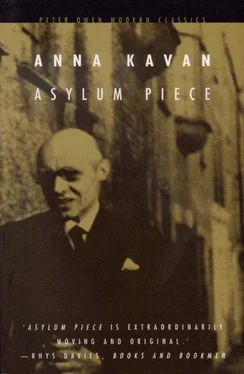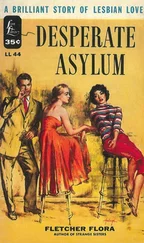The girl is abreast of him now; her thick, curly hair blows out like a fleece in the sun. The gravel crunches, minute particles of grit fly up from under the tyres; there is a greeting, a flash of teeth and a whirring noise. She has gone.
Hans stands for a moment watching the departing form of the gym mistress. The smile slowly fades from his face and he begins to walk on. His loitering steps carry him as a matter of course in the direction of the atelier. On his way he passes the vegetable garden where several patients are working. Two of them, in blue overalls, are hoeing the parched earth quite close to the path where he walks. A man near by, who looks like a gardener, is really a nurse who is keeping them under his eye. Hans pauses to watch the workers who do not return his gaze. The ground is baked dry, it is hard work, sweat runs down their faces. The two men do not speak to each other, nor do they look happy; yet Hans, who detests hard work, almost envies them their place in the established order of institutional life to which he now feels himself an outsider. He wanders on past another man who is picking blackberries. The blackberry bushes have been trained over wires, and the patient stands with his back to Hans, intent on his prickly task, carefully picking out the berries and putting them into a basket. Hans would like to speak to him, but the unresponsive look of the man’s back deters him, and he walks on in silence, looking abstractedly at the path.
His thoughts fall back into their usual unhappy pattern — money troubles, bad health, insecurity. Once more he fingers the letter in his pocket. Yes, the poor old factory is certainly in a bad way — perhaps even on its last legs. How broken-hearted father would have been! A good thing the old man didn’t live to see these terrible times. But what about Hans’s own enterprise, the small private business which he has built up by his personal efforts? For the hundredth time he tries to think of some reason why he has not heard from his partner for such a long time. It’s over a month since the fellow has written. ‘Can he be ill? Is he double-crossing me? Or has he really written and they have kept the letters from me because of more bad news? I really ought to go and find out what’s happening. I ought to go at once — to-morrow. If I wait I may be too late.’ But the thought of taking a long train journey alone, of talking to strangers and concentrating upon business problems is too much for poor Hans. ‘I can’t do it. It’s no use. They shouldn’t expect it of me in my condition. I’m ill — I can’t sleep, I can’t eat, I can’t make decisions. I can’t even think properly any more. .’ He passes his hand over his dark hair with a despairing gesture, takes off his glasses for a moment, and then, dazzled, hastily puts them back on his nose.
Now he has reached the atelier. A confused hum of activity comes from within. In the carpenter’s shop someone is hammering. A machine in one of the other rooms makes a thin buzzing noise like a wasp. The various workshops open on to a veranda raised several steps above the path where Hans is walking, but looking up he can see the faces of the people near the windows and doors. With some of them he exchanges a nod. They are busy with book-binding or leather-work or basket-making. The official in charge of the atelier comes out on to the veranda for a minute to wish Hans good day. He behaves as though it were quite in order for him to be strolling out there when all the rest of the clinic is hard at work. This attitude on the part of the supervisor confirms the young man’s worst fears and he moves off immediately.
At the last open door a girl is sitting alone, working at a sketch on an easel. ‘Hullo, Hans!’ she calls out amiably.
He stops and leans against the stone wall of the veranda. He would like to see what she is painting, but the effort required to mount the steps is too great, and he stays where he is, looking up at her wistfully.
‘Why do you always wear those dark clothes?’ she asks him. ‘You look so hot and dismal — as if you were going to a funeral or a dreary business appointment.’
‘Well, you see, it’s like this,’ he begins to explain, feeling the stone warm under the palms of his hands, ‘I never could decide what to put on. Every morning when I started to dress I used to put out all my suits in a row, and it would take me perhaps half an hour, perhaps longer, to make up my mind. The same thing happened with my shoes — with my ties — it was really awful. You can’t think how this silly affair used to worry me. So at last I thought of a plan to avoid making a choice. I just put on the same suit every day. This is the one I wore when they took us to that concert in Geneva; I’ve worn it ever since.’
The girl doesn’t say any more. She doesn’t see his forlorn expression. Perhaps she is not interested; perhaps her painting absorbs her just then; or perhaps she has simply fallen into a dream.
Hans moves away. Suddenly he feels envious, bitter. ‘She’s well — not nearly as ill as I am, at any rate. And yet she can stay here as long as she likes while I shall be turned out in a day or two to face the world.’
So far he has been dawdling along, but now he comes to a decision and starts to walk briskly. He will send another telegram to his partner and this time he will word it so that it is bound to bring a reply. Out he goes into the dusty public road that leads to the village. He has no business to be there, but what does it matter? He has often done it before, and anyway, nobody seems to care what he does these days.
Soon he comes to the street of humble, rather squalid houses, shuttered against the heat. Most of the dwellings are built in one with their cowsheds or stables. In front of one an enormous heap of manure slowly steams in the sun. The overpowering smell of manure, the heat, the quick walk, combine to make Hans feel dizzy for a few seconds. He stands still, bending his head, and looking down at his shoes, now white like a tramp’s with the dust. With fumbling fingers he unfastens his jacket. A tiny split in the front of his shirt catches his eye. ‘But I’m going about in rags — absolutely in rags! It will be the gutter for me next,’ he mutters under his breath, with a sort of mild, aggrieved surprise.
Now he is at the post office. He pulls himself together and goes inside. The empty room smells fustily of dried ink, just outside the window some shabby, gaunt hens are pecking in an enclosure of wire netting overgrown with convolvulus. Hans observes with distaste all the details of the place with which he is already only too familiar. The postmaster appears. He is an oldish, pot-bellied peasant with grizzled hair. Carefully, with much thought, Hans writes out his message and hands the telegraph form over the counter.
After the young man has gone, the postmaster stands for a time holding the telegram against his huge belly, and watching the door as if he half expects the sender to come back. Then, in a methodical way, he sets about tearing the form into small pieces, until nothing is left but a handful of shreds which he negligently tosses out of the open window. With greedy eyes, the hens come rushing on their strong, scaly legs, pouncing on the torn fragments. But immediately discovering that the paper scraps are inedible, they abandon them in disgust and resume their unprofitable pecking in the hard earth.
An elderly man and his wife are standing in the chief doctor’s study. The husband is a big, tall man who is beginning to stoop a little. He has a serious, important face with a large grey moustache and pouches under the eyes. In his buttonhole he wears a narrow red ribbon. He is rather a fine figure for his age and is obviously used to being in a position of command. His wife, on the other hand, is nondescript and ineffective looking. One realizes at once that she has been dominated by her husband ever since their marriage, and by her parents before that.
Читать дальше












